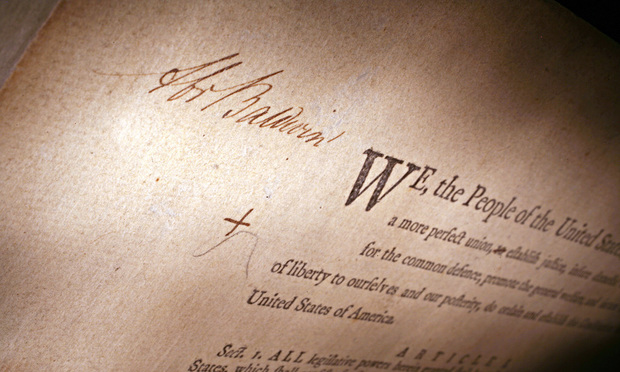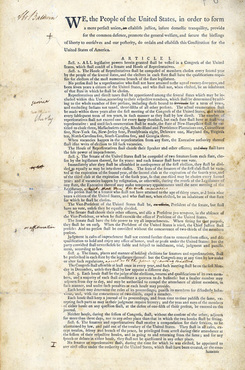See a Document From the Room Where It Really Happened
The four-page draft of the Constitution was supposed to have been destroyed when the final document was completed, but Georgia lawyer Abraham Baldwin kept his copy.
September 13, 2018 at 03:05 PM
3 minute read
 Georgia lawyer Abraham Baldwin, a signer of the U.S. Constitution, saved his draft copy. (Photo: Russ Bryant, courtesy of Georgia Historical Society)
Georgia lawyer Abraham Baldwin, a signer of the U.S. Constitution, saved his draft copy. (Photo: Russ Bryant, courtesy of Georgia Historical Society)
The Georgia Historical Society on Monday will publicly display a near-final draft of the U.S. Constitution, with changes and margin notes made by Georgia lawyer Abraham Baldwin.
Baldwin was one of two representatives from Georgia at the Constitutional Convention who signed the final document that was released 281 years ago, on Sept. 17, 1781.
The four-page draft issued a few days earlier was supposed to have been destroyed when the final Constitution was completed, but Baldwin kept his copy. “The Georgia Historical Society is grateful to this day” for Baldwin's defiance of the instruction, said Patricia Meagher, the society's communication director. Only about 12 copies of the draft remain, she added.
According to an article by Robert Weber in the group's magazine, Georgia History Today, Baldwin received one of about 60 copies of a draft produced by a “Committee of Style and Arrangement.” The committee consisted of five members, including Alexander Hamilton and James Madison.
 A draft copy of the U.S. Constitution used by Abraham Baldwin, Georgia signer to the Constitution. (Courtesy photo/Georgia Historical Society)
A draft copy of the U.S. Constitution used by Abraham Baldwin, Georgia signer to the Constitution. (Courtesy photo/Georgia Historical Society)A photo of the first page provided by the society shows that Baldwin noted several changes from the draft that can be seen in the final Constitution. In Article I, Section 2, Baldwin scratched out “servitude” and wrote “service” in the margin next to this sentence: “Representatives and direct taxes shall be apportioned among the several states which may be included within this Union, according to their respective numbers, which shall be determined by adding to the whole number of free persons, including those bound to servitude for a term of years, and excluding Indians not taxed, three fifths of all other persons.”
In Section 3, Baldwin scratched in another change with a neat carat after the word “Oath” and in the margin adding “or affirmation,” in this part: “The Senate shall have the sole power to try all impeachments. When sitting for that purpose, they shall be on oath.”
Such changes “are valuable as evidence of the convention's evolving collective approach to drafting a framework of government,” Weber wrote.
Typically, the document can be viewed only by appointment, but Monday's event will be free and open to the public, from 9 a.m. to 6 p.m.
This content has been archived. It is available through our partners, LexisNexis® and Bloomberg Law.
To view this content, please continue to their sites.
Not a Lexis Subscriber?
Subscribe Now
Not a Bloomberg Law Subscriber?
Subscribe Now
NOT FOR REPRINT
© 2025 ALM Global, LLC, All Rights Reserved. Request academic re-use from www.copyright.com. All other uses, submit a request to [email protected]. For more information visit Asset & Logo Licensing.
You Might Like
View All
Troutman Pepper Says Ex-Associate Who Alleged Racial Discrimination Lost Job Because of Failure to Improve
6 minute read
Apply Now: Superior Court Judge Sought for Mountain Judicial Circuit Bench
3 minute read
Law Firms Expand Scope of Immigration Expertise Amid Blitz of Trump Orders
6 minute read
Bass Berry & Sims Relocates to Nashville Office Designed to Encourage Collaboration, Inclusion
4 minute readTrending Stories
- 1'Lookback Window' Law for Child Abuse Cases Constitutional, State High Court Finds
- 2Troutman Pepper Says Ex-Associate Who Alleged Racial Discrimination Lost Job Because of Failure to Improve
- 3Texas Bankruptcy Judge Withdraws Ethics Complaint Against Jackson Walker
- 4Apply Now: Superior Court Judge Sought for Mountain Judicial Circuit Bench
- 5Harrisburg Jury Hands Up $1.5M Verdict to Teen Struck by Underinsured Driver
Who Got The Work
J. Brugh Lower of Gibbons has entered an appearance for industrial equipment supplier Devco Corporation in a pending trademark infringement lawsuit. The suit, accusing the defendant of selling knock-off Graco products, was filed Dec. 18 in New Jersey District Court by Rivkin Radler on behalf of Graco Inc. and Graco Minnesota. The case, assigned to U.S. District Judge Zahid N. Quraishi, is 3:24-cv-11294, Graco Inc. et al v. Devco Corporation.
Who Got The Work
Rebecca Maller-Stein and Kent A. Yalowitz of Arnold & Porter Kaye Scholer have entered their appearances for Hanaco Venture Capital and its executives, Lior Prosor and David Frankel, in a pending securities lawsuit. The action, filed on Dec. 24 in New York Southern District Court by Zell, Aron & Co. on behalf of Goldeneye Advisors, accuses the defendants of negligently and fraudulently managing the plaintiff's $1 million investment. The case, assigned to U.S. District Judge Vernon S. Broderick, is 1:24-cv-09918, Goldeneye Advisors, LLC v. Hanaco Venture Capital, Ltd. et al.
Who Got The Work
Attorneys from A&O Shearman has stepped in as defense counsel for Toronto-Dominion Bank and other defendants in a pending securities class action. The suit, filed Dec. 11 in New York Southern District Court by Bleichmar Fonti & Auld, accuses the defendants of concealing the bank's 'pervasive' deficiencies in regards to its compliance with the Bank Secrecy Act and the quality of its anti-money laundering controls. The case, assigned to U.S. District Judge Arun Subramanian, is 1:24-cv-09445, Gonzalez v. The Toronto-Dominion Bank et al.
Who Got The Work
Crown Castle International, a Pennsylvania company providing shared communications infrastructure, has turned to Luke D. Wolf of Gordon Rees Scully Mansukhani to fend off a pending breach-of-contract lawsuit. The court action, filed Nov. 25 in Michigan Eastern District Court by Hooper Hathaway PC on behalf of The Town Residences LLC, accuses Crown Castle of failing to transfer approximately $30,000 in utility payments from T-Mobile in breach of a roof-top lease and assignment agreement. The case, assigned to U.S. District Judge Susan K. Declercq, is 2:24-cv-13131, The Town Residences LLC v. T-Mobile US, Inc. et al.
Who Got The Work
Wilfred P. Coronato and Daniel M. Schwartz of McCarter & English have stepped in as defense counsel to Electrolux Home Products Inc. in a pending product liability lawsuit. The court action, filed Nov. 26 in New York Eastern District Court by Poulos Lopiccolo PC and Nagel Rice LLP on behalf of David Stern, alleges that the defendant's refrigerators’ drawers and shelving repeatedly break and fall apart within months after purchase. The case, assigned to U.S. District Judge Joan M. Azrack, is 2:24-cv-08204, Stern v. Electrolux Home Products, Inc.
Featured Firms
Law Offices of Gary Martin Hays & Associates, P.C.
(470) 294-1674
Law Offices of Mark E. Salomone
(857) 444-6468
Smith & Hassler
(713) 739-1250






